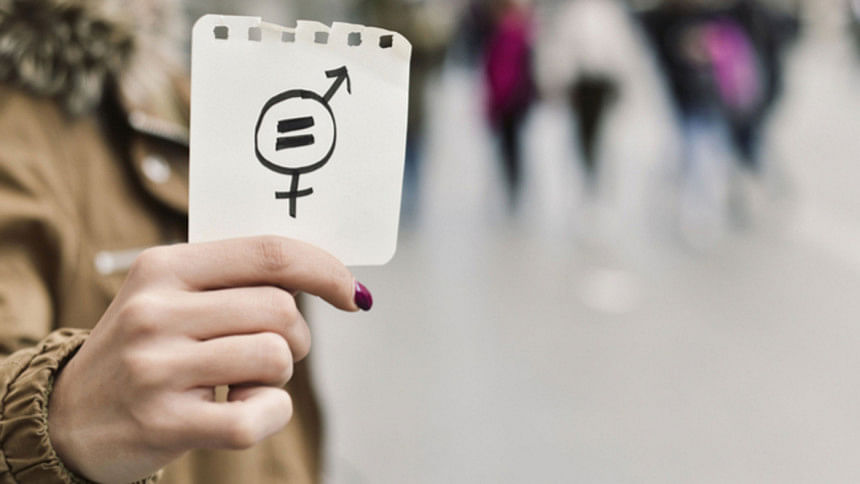Let us write new stories

"Girls do not look smart, they are pretty"—said a five-year-old Bangladeshi boy after a comment by the mother that his sister (three years old) was looking "smart". The mother had to explain that both boys and girls could be smart and pretty. How does a five-year-old develop such gender stereotyped attitudes? Most of our boys grow up to believe that girls and women are weak and dependent. In many cases, girls also become obsessed with beauty and learn to be passive. Boys and girls develop certain understandings of masculinity and femininity and their expected behaviour, which ultimately affects both of them negatively in realising their potential. But why?
"If you raised a girl in a jungle, there's no chance she would wish to play with pretty dresses or worry about her body type. These ideas come from somewhere. Deep societal changes need to start with children, so if we keep teaching them the same stereotypes and prejudices, then society will not change."
Rosie Allen wrote this to describe the "Dangers of Disney", her project on the messages that are being taught to children through most Disney films. She has given her own interpretation of various stories through paintings and added text for explanation. Visiting her exhibition in London more than a year ago was very thought-provoking, where she critically examined some of the popular stories (Cinderella, Beauty and the Beast, Snow White, Sleeping Beauty etc) and raised questions on abuse in romantic relationships, the importance of consent, obsession with physical beauty, fear of ageing etc.
It is not only Disney stories that are problematic. Most traditional fairy tales, including those in Bangla, are sexist. Moreover, popular television shows, magazines, films, advertisements etc continue to promote gender stereotypes. Social media is flooded with derogatory jokes and comments about women. Children are exposed to stories where a girl's aspiration is just to look beautiful, wait for a man and make him happy. It has been normalised that men have a monopoly on power and women should submit to their authority. How will girls and boys learn about respect and equality in relationships if these are the images of women that we share with them? Where are the realistic body images, the focus on personality and inspiration instead of looks and love?
Having the right legal and policy framework as well as implementing them remain very important in ending violence against women. But laws and policies have limited impact as long as social acceptance of a practice is widespread. The books children and young people read, the films/animations they watch, the games they play and the gender relations they observe in families, play a critical role in forming their own attitudes and behaviour.
What do we know about the attitudes of young men in Bangladesh? The findings of the report "Male Youth and Their Sexual and Reproductive Health and Rights (SRHR) in Bangladesh: A Mixed-Methods Nationwide Study," conducted by James P Grant School of Public Health of Brac University in October, 2020, revealed that 62 percent of respondents believed that there are times when wives "deserved to be beaten". Some 63 percent, from both urban and rural areas, agreed that "wives can be beaten if they deny to have sex with their husbands". The study had 11,102 male respondents (15-24 years) and was conducted in all 64 districts.
What are the views of the women? According to "Wife Beating: A Population-Based Study in Bangladesh"published in Violence and Gender in November, 2014, "Of all the women who accept being beaten by their husbands, 23 percent accept it as a result of an argument, 18 percent due to neglecting their children, 17 percent due to going out without their husband's permission, eight percent due to refusal of sex with husband, and four percent due to burning the food." In this study, 17,842 women were included.
Why do both men and women of our society consider violence against women to be acceptable? We know that violence against women and violence against children are fuelled by powerful patriarchal norms, which condone violent discipline like wife beating and corporal punishment, promote masculinity based on violence and control, prioritise family regulation and blame victims, and disregard gender equality. The lower status of women in general must be challenged by ending legal discrimination and changing social norms. Boys and men will learn to respect women and treat them equally if they see women as equal in families and society. Girls and women also need positive role models so that they become empowered and can assert themselves. Are we ensuring this?
It is encouraging to note some initiatives in various places, including Bangladesh, to portray strong girls and women through stories and films these days, but we need more. Now, some of the female characters are in charge of their own destinies and do not need to be rescued by anyone. Isn't it fascinating that Swedish writer Astrid Lindgren created Pippi Longstocking almost 75 years ago, when many cultures still did not have strong girl characters? Pippi, "the bravest girl of the world", is intelligent, funny, kind, warm, independent and friendly. Her stories have been translated to more than 80 languages. The boys and girls who celebrate Pippi books will definitely have very different approaches to gender equality than those reading or watching traditional stories.
Our girls should be raised so that they are self-confident, strong, ambitious, courageous and humane. Boys must be taught to respect girls and women. This should start in our families. Parents need to choose very carefully the types of books, films, toys etc. their children are exposed to. There should be gender equitable relationships among adult members of households. There must be efforts by media to ensure that they disseminate positive images regarding gender roles. It is the responsibility of state to treat each citizen equally. Only then can violence against women end. Each of us will have to play our part.
Laila Khondkar is an international development worker.

 For all latest news, follow The Daily Star's Google News channel.
For all latest news, follow The Daily Star's Google News channel. 



Comments